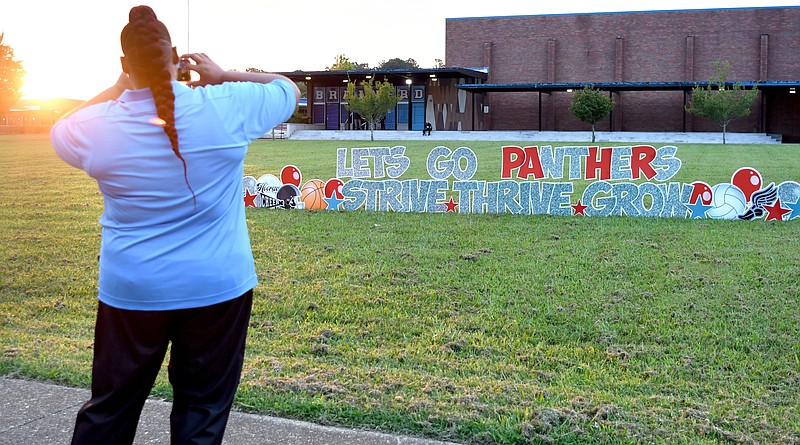Hamilton County students aren't showing as much academic growth compared to their peers in other districts, according to state data released Monday.
The district received a systemwide score of one - out of a possible five - through the Tennessee Value-Added Assessment System, which evaluates student performance year over year and compares it to their peers.
A score of one means the district's students made less academic growth than expected, and a score of five means the students achieved more growth than expected.
However, when it comes to proficiency, which is measured by the Tennessee Comprehensive Assessment Program, Hamilton County Schools outperformed the state in several subject areas for the 2021-22 school year. Shannon Moody, chief strategy officer for Hamilton County Schools, said in an interview that throughout the pandemic, the county's testing scores remained steady while other districts in the state saw significant declines.
This is likely why the district saw less academic growth compared to other districts, Hamilton County Board of Education Chairman Tucker McClendon, R-East Ridge, said in a phone interview Tuesday.
"The results of TVAAS are nothing that we should be proud of, at all," McClendon said. "But, even during COVID, when a lot of districts saw declines, we saw growth. So, as they're catching up from post-COVID, we've already seen those accelerated gains."
To explain the difference between proficiency and growth, Moody drew an analogy to a running track.
"Proficiency is like counting the number of students that crossed the finish line," Moody said. "Growth is more about looking at did students keep up with the pace of their peers as they ran around the track."
McClendon said, as an example, it's harder to move from 85% to 90% than it is to move from 70% to 80%.
"It's not an excuse by any means," McClendon said. "We have to own it, we have to do better and we need to keep up our growth year over year. It's something that we should strive to do and be a five every single year."
THE NUMBERS
For all grades, in the areas of literacy, numeracy and science, Hamilton County Schools received a composite score of one. In social studies, the district earned a four.
However, certain student groups performed better in different subject areas.
High-schoolers showed strong growth, with a score of five in the areas of literacy, literacy and numeracy combined, and an overall composite score of five.
(Read More: Hamilton County Schools' assessment scores best since 2017 for some subjects)
Career and technical education students, or students who attend Future Ready Institutes offered at 13 high schools, also performed well. These students scored a five in literacy, literacy and numeracy combined, and social studies.
Students with a career and technical education concentration, who don't necessarily attend Future Ready Institutes, received a five in literacy, literacy and numeracy combined, and had a composite score of five.
Grades K-8 showed little growth, with scores of one for all subject areas except for social studies, which received a four.
Other major metro Tennessee school districts earned better overall composite scores while one metro district received the same score as Hamilton:
- Shelby County Schools: 5
- Davidson County Schools: 5
- Knox County Schools: 1
"It's been a rough two years for principals and teachers, and this is really hard for them to see," Superintendent Justin Robertson said in an interview Friday, referencing the pandemic and teacher burnout.
"When you know how much principals and teachers and leaders have put into it, and it doesn't turn out the way you want it to, that's difficult," he said.
KEEPING UP WITH THE PACK
"Even as our kids are achieving, we want to make sure that every kid, kids that aren't performing on grade level and our kids that are performing at the highest level, are growing at a rate that's faster than their peers," Robertson said.
Strategies to close the academic growth gap are now in place, he said.
Those strategies include a more personalized approach to education combined with an emphasis on academic success.
Personalized education is a mix of culture and care with aspects of social-emotional learning, Deputy Superintendent Sonia Stewart said in an interview.
Schools are creating more opportunities for teachers to connect with students and students to connect with one another, she said. This involves check-in meetings at the beginning and end of the school day. Students are asked how they're doing or feeling and given a chance to get to know each other.
"All the brain science says that when kids feel connected like that, when they have joy, their brains are much more open to (academic press)," Stewart said. "When we do that thing well, our kids are more ready to learn and, therefore, learn more. They also come to school more."
McClendon said the district is also looking at bridging the gap across all three grade bands, with an emphasis on expanding career and technical education programs.
As part of that effort, the board is expected to vote Thursday to approve grant applications for the Innovative Schools Model Grant through the Tennessee Department of Education. The grant is part of Gov. Bill Lee's 2023 budget that includes a $500 million investment in innovative school models as a way to eliminate structural barriers that exist between high school, the workforce and postsecondary education.
Hamilton County Schools would receive $23.5 million.
(Read More: How Hamilton County Schools is combating racial disparities in literacy)
Contact Carmen Nesbitt at cnesbitt@timesfreepress.com or 423-757-6327. Follow her on Twitter @carmen_nesbitt.
